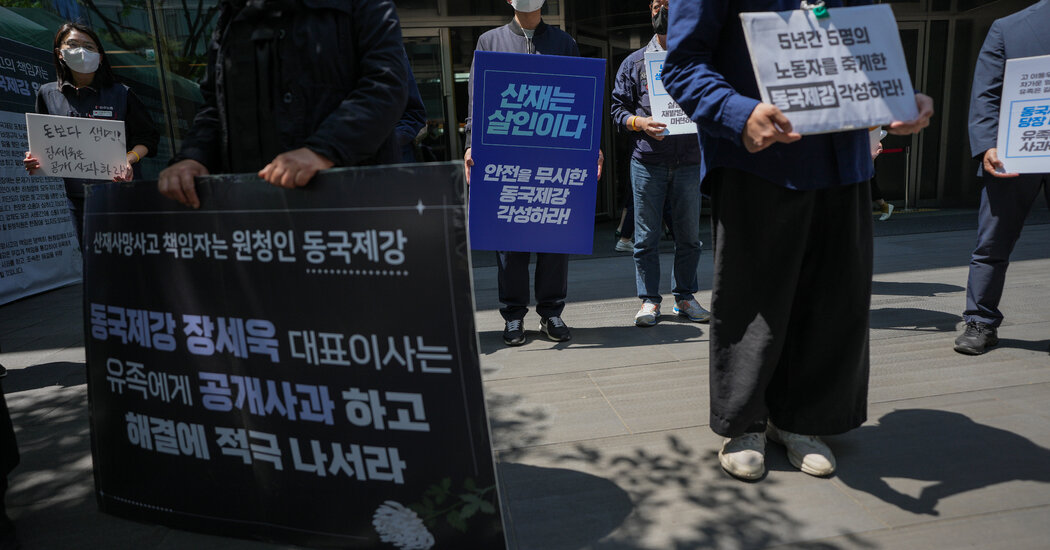
SEOUL — A boss orders a worker to feed and clean up after his dog. An airline heiress makes a taxiing passenger plane return to the gate to remove a flight attendant who rubbed her the wrong way. The 10-year-old granddaughter of a newspaper tycoon hurls insults at her chauffeur, threatening to fire him for being spoiled.
Such behavior has become so common in South Korea that the country now has a name for it: “gapjil.”
The word is a portmanteau for when “gap,” people with power, abuse “eul,” those who work for them. And in South Korea’s deeply hierarchical society, where one’s social standing is determined by profession, job title and wealth, hardly anyone has escaped its claws.
More recently, though, gapjil has triggered a backlash. On websites, street banners and even stickers in public bathrooms, government agencies, the police, civic groups and corporations are offering “gapjil hotlines” encouraging citizens to blow the whistle on officials and bosses who abuse their authority.
Using bullying language, offering bribes, preying on subcontractors and failing to pay workers on time are all examples of gapjil. On college campuses, students are hanging placards accusing “gapjil professors” of sexual harassment.
The campaigns appear to be working. Politicians, senior government officials and corporate bigwigs have all seen their reputations ruined after gapjil scandals. The public has swelled with pride — and a good dose of schadenfreude — while watching the rich and powerful fall from grace for being, well, jerks.
Gapjil became an election issue during the presidential campaign. The wife of Lee Jae-myung, a leading candidate, was forced to apologize after she was accused of treating government officials as though they were her personal servants, having them pick up takeout food and do her holiday shopping while Mr. Lee was a provincial governor. Mr. Lee lost the election by a razor-thin margin.
“South Koreans live with an enormous tolerance for abuse, but when they can’t take it anymore and explode, they call it gapjil,” said Park Chang-jin, a former Korean Air flight attendant who campaigns against gapjil as a leader of the small opposition Justice Party.
Mr. Park knows the feeling.
In 2014, Cho Hyun-ah, the daughter of the former Korean Air chairman Cho Yang-ho, forced a passenger jet taxiing at Kennedy International Airport in New York to return to the gate because she didn’t like the way the macadamia nuts were served to her in first class. Mr. Park and another flight attendant were made to kneel before Ms. Cho, who let the plane depart only after Mr. Park had been kicked off the plane.
The Korean Air family became the epitome of gapjil again, in 2018, when audio and video files emerged showing another daughter, Cho Hyun-min, and her mother, Lee Myung-hee, screaming insults at workers. The chairman had to apologize and banish both of his daughters from management positions at the company.
There was a time when South Koreans were more likely to tolerate such behavior, especially when it involved the superrich families who run the country’s business conglomerates, known as chaebol, said Park Jum-kyu, an official at Gabjil 119, a civic group that offers legal advice for victims. (The group uses an alternate spelling of the word.)
“But people now demand higher standards on what behavior is acceptable and what is not,” Mr. Park said. “Now, when someone says to an authority figure, ‘Are you doing gapjil to me?’ the accusation packs a punch.”
South Korea has one of the longest workweeks among the world’s wealthier nations, and gapjil is often cited as one of the reasons behind the country’s miserable work conditions. The phenomenon takes many forms, like excessive hours with no overtime and bullying by supervisors.
“I hated it when they seemed to have nothing to do other than going around the office commenting on female workers’ clothes, saying that we could not get married because of the way we dressed,” said Hong Chae-yeong, referring to older male managers at her former corporate job. Ms. Hong, 30, said that behavior was one of the reasons she had quit.
Corporate and government elites have been notorious for a type of gapjil known as “imperial protocol,” which includes having a row of underlings hold umbrellas or commandeer elevators while ordinary people are forced to take the stairs. In 2017, Kim Moo-sung, a political boss, became a symbol of that sort of entitlement when he rolled a suitcase at an assistant at the airport. He later became the subject of public ridicule.
Some trace the origins of gapjil to South Korea’s military dictators, who enforced a command-and-compliance culture that remains pervasive. It is both “the basic grammar” and “a deep rooted malaise” of a South Korean society that reflects the “rankism its people are addicted to,” Kang Jun-man, a media scholar, wrote in his book on gapjil.
“People who suffer gapjil at work commit gapjil themselves when they are in the position of authority, as when they talk to a call-center employee on the phone,” said Cho Eun-mi, 37, who quit a stationery factory in April because of her manager’s abusive language.
But the country’s march toward democracy is also filled with stories of rebellion against the powerful: citizens driving a dictator into exile, taking up arms against a military junta and holding massive rallies to win a right to free election.
The impeachment of President Park Geun-hye in 2017 was started when it was revealed that her secret adviser, Choi Soon-sil, was accused of forcing an elite university to change its admission policies to accept her daughter. “Money speaks,” the daughter said in a Facebook comment that triggered public outrage.
The recent trend of whistle-blowing on gapjil also reflects a deep mistrust of the justice system in South Korea, where many have said the courts rarely punish corporate elites who act as though they are above the law. In 2007, Kim Seung-youn, chairman of the Hanwha conglomerate, was imprisoned only briefly after assaulting workers.
And in 2010, Chey Cheol-won, a member of the family that ran the SK conglomerate, received only a suspended prison sentence after battering a union activist with an aluminum baseball bat.
When victims of gapjil exhaust resources to address their grievances legally, they often resort to exposing the abusers in the court of public opinion, usually with the help of camera phones and social media. In 2018, video footage emerged of Yang Jin-ho, the head of an online file-sharing company, ruthlessly slapping a former employee.
In 2017, audio files emerged of Lee Jang-han, chairman of the pharmaceutical company Chong Kun Dang, harassing his chauffeur with a stream of insults. “What kind of bastard your father was to have raised a son like you?” he said.
Mr. Yang was imprisoned for violence and other crimes, while Mr. Lee was forced to hold a news conference to apologize.
Despite the anti-gapjil movement, South Korea may have a long way to go to make its work environment more fair and its society more equal. A law against workplace harassment took effect in 2019, but it mandates only disciplinary actions or a financial penalty of up to $8,000 against offenders. In a survey by Gabjil 119 last year, nearly 29 percent of workers reported abuse at work.
“Gapjil is still treated as something that should be resolved within the company,” said Yun Ji-young, a human rights lawyer who helps gapjil victims. “There is a huge animosity against people who take the problem outside.”
Without more accountability, though, Mr. Park at Gabjil 119 fears little will change for South Korean workers being tormented by their abusive bosses. “We have ended the military dictatorship, and we have impeached a president,” he said. “But we still have to change our workplace culture.”




